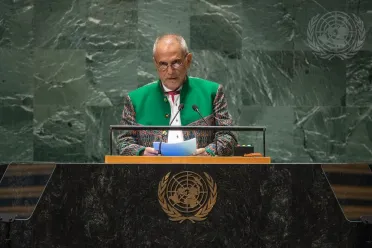Statement
Statement summary
JOSÉ RAMOS-HORTA, President of Timor-Leste, spotlighting that his country is a young, imperfect and vibrant democracy, “an oasis of peace, tolerance and freedom”, said that, since its independence in 2002, the democracy is “alive and dynamic”. Noting that Timor-Leste is the most democratic country in South-East Asia, he observed: “We are a multicultural, multi-religious, multilingual and multi-ethnic society. With humility we continue to build the country, that is open to the world, tolerant, free of hate and violence.” Moreover, Timor-Leste has no political violence, no tensions or crimes based on ethnicity or religion, no domestic organized crime, no armed robberies. However, multidimensional poverty remains high — around 45.8 per cent, he noted, pointing to challenges related to food insecurity, neonatal mortality, rickets and child malnutrition.
Over the 20 years of the country’s independence and the 10 years of its Association of Southeast Asian Nations (ASEAN) membership, most economic and social indicators show progress, he reported, observing that life expectancy has risen from 60 years in 2002 to 70 years in 2023. Recalling that in 2002, the capital of Timor-Leste had partial energy coverage, while the rest of the country did not have such “privilege”, he reported that currently power is available in 96.1 per cent of its territory. Moreover, it financed its national budget with the return of the sovereign fund, with an annual return on 9 per cent. Emphasizing that global crises result in geopolitical fragmentation and disproportionally impact fragile countries, he condemned the ongoing war in Ukraine, which has disrupted global trade in grain and energy. From its history, Timor-Leste knows that wars are seldom won on the battlefield, he stressed, encouraging negotiations.
He went on to underline the need for a new outlook on climate and security nexus, proposing a “bold initiative” to accelerate energy transition in fragile developing States that depend on oil and gas production. Unlocking finance through debt alleviation, streamlining international finance at the lowest interest rates and increasing development assistance will facilitate greenhouse gas mitigation and climate change adaptation. The initiative will also consider the challenges of fragile States in economic turmoil and seek to ensure that the “quest” for rare earth elements and critical minerals does not lead to further instability, nor exacerbate local tensions in the countries where such strategic reserves are found. Noting that “the super-rich CEOs [chief executive officers] of banks and creditor countries remain indifferent to debt cancellation calls”, he stressed: “Cancel off this damn debt.” It would be a leap forward in international solidarity if all Organisation for Economic Co-operation and Development (OECD) countries were to allocate 1 per cent of their national gross domestic product (GDP) to official development assistance (ODA).
“We live in a universe full of dualities: an increasingly prosperous world, whose wealth has increased by $30 trillion a year,” he observed, adding that the leaders of the Group of Seven (G7) and Group of 20 (G20) fail to reflect this in the fight against hunger, stunting and other forms of poverty. To this end, he underscored the need of adopting a universal child benefit — a new ODA target for a fair share for children in fragile income countries. “No one should fear the Chinese, Indian, European, American ‘super-Powers’,” he underscored, noting that States can gain more from the free movement of people and goods than from building walls. He went on to say that “equally, we want to see prosperity in Europe, Japan, South Korea and Australia”, while emphasizing that it depends on peace and stability in the Global South.
President José Ramos-Horta of Timor-Leste drew attention to the impact of rising temperatures in worsening conflicts and violence, particularly in vulnerable States.
“We need a new outlook on the climate and security nexus, which will address the impacts of climate change and environmental degradation on peace, security and ensure that the quest for energy transition does not worsen the security situation in fragile countries,” he said.
Full statement
Read the full statement, in PDF format.
Photo

Previous sessions
Access the statements from previous sessions.
